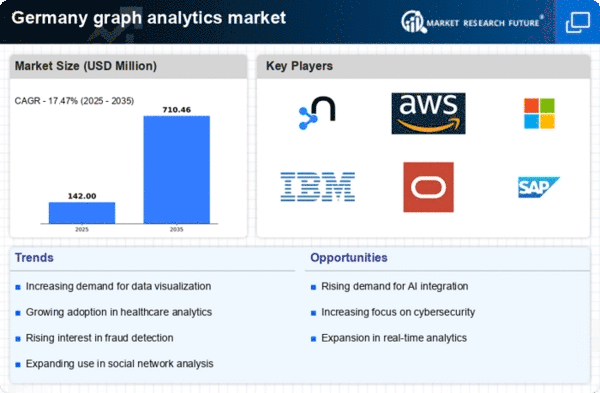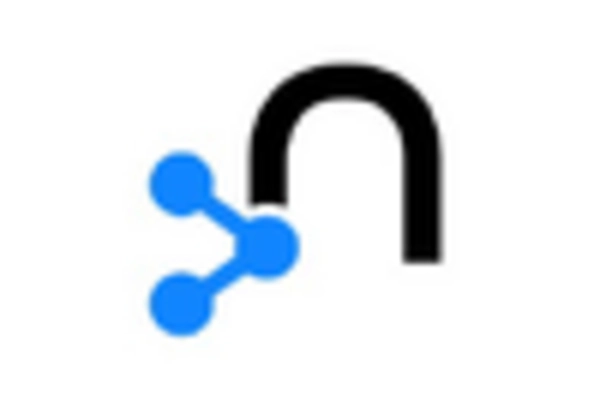Integration of Graph Analytics with IoT
The integration of graph analytics with the Internet of Things (IoT) is emerging as a pivotal driver for the graph analytics market in Germany. As IoT devices proliferate, the volume of interconnected data generated increases exponentially. Graph analytics provides a robust framework for understanding complex relationships within this data, facilitating insights that are crucial for sectors such as smart cities and industrial automation. The market for IoT analytics is expected to reach €10 billion by 2026, with graph analytics playing a significant role in this growth. This integration not only enhances data interpretation but also supports predictive maintenance and operational efficiency, thereby propelling the graph analytics market forward.
Rising Demand for Real-Time Data Processing
The graph analytics market in Germany experiences a notable surge in demand for real-time data processing capabilities. Organizations increasingly recognize the necessity of analyzing data as it flows, enabling them to make timely decisions. This trend is particularly evident in sectors such as finance and telecommunications, where the ability to process and analyze vast amounts of data in real-time can lead to competitive advantages. According to recent estimates, the market for real-time analytics is projected to grow at a CAGR of approximately 25% over the next five years. This growth is likely to drive investments in graph analytics solutions that can efficiently handle real-time data streams, thereby enhancing the overall performance of the graph analytics market in Germany.
Advancements in Cloud Computing Technologies
The advancements in cloud computing technologies are reshaping the landscape of the graph analytics market in Germany. With the increasing adoption of cloud-based solutions, organizations are now able to access powerful graph analytics tools without the need for extensive on-premises infrastructure. This shift not only reduces operational costs but also enhances scalability and flexibility. The cloud segment of the graph analytics market is projected to grow at a CAGR of around 20% over the next few years. As more businesses migrate to the cloud, the demand for graph analytics solutions that can seamlessly integrate with cloud platforms is expected to rise, further driving market growth.
Emergence of Advanced Visualization Techniques
The emergence of advanced visualization techniques is becoming a crucial driver for the graph analytics market in Germany. As organizations seek to derive actionable insights from complex data sets, the ability to visualize relationships and patterns becomes paramount. Innovative visualization tools enable users to interact with data in intuitive ways, facilitating better decision-making processes. The market for data visualization is anticipated to grow significantly, with graph analytics playing a central role in this evolution. Enhanced visualization capabilities not only improve user engagement but also empower businesses to communicate insights effectively, thereby fostering the growth of the graph analytics market.
Growing Focus on Fraud Detection and Risk Management
In Germany, the graph analytics market is significantly influenced by the growing focus on fraud detection and risk management across various industries. Financial institutions, in particular, are leveraging graph analytics to identify suspicious patterns and relationships that may indicate fraudulent activities. The ability to visualize and analyze complex networks of transactions allows organizations to enhance their security measures effectively. Recent studies suggest that the implementation of graph analytics can reduce fraud-related losses by up to 30%. As regulatory pressures increase, the demand for advanced analytics solutions that can provide deeper insights into risk management is likely to bolster the graph analytics market.
















